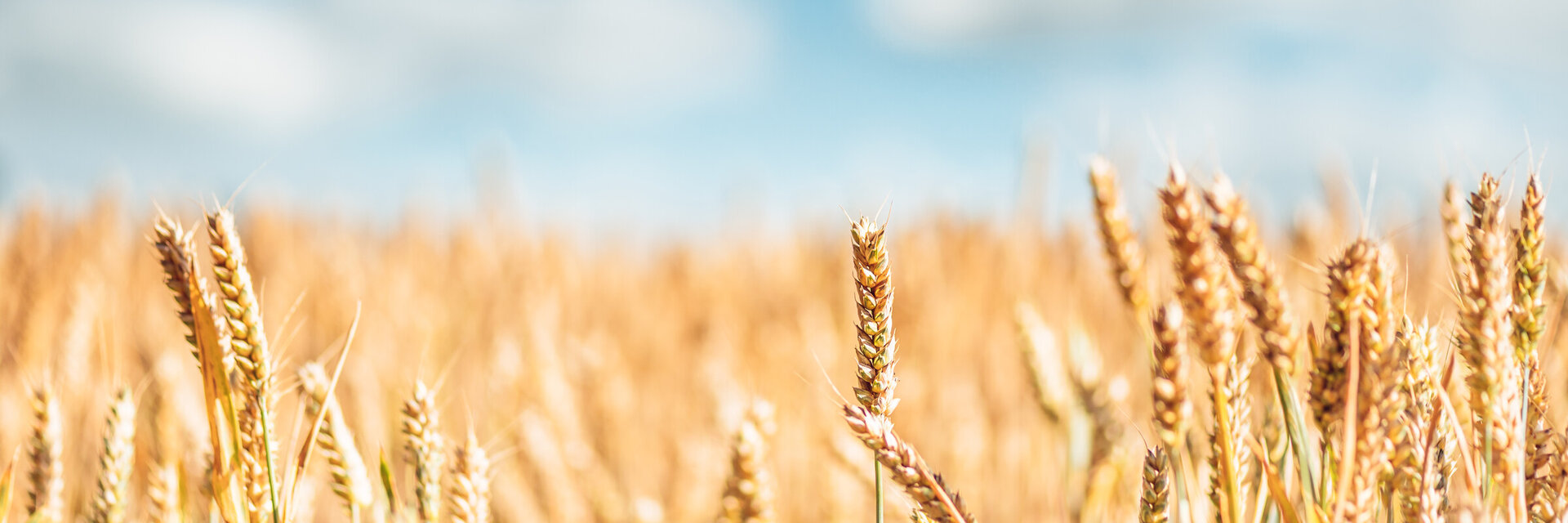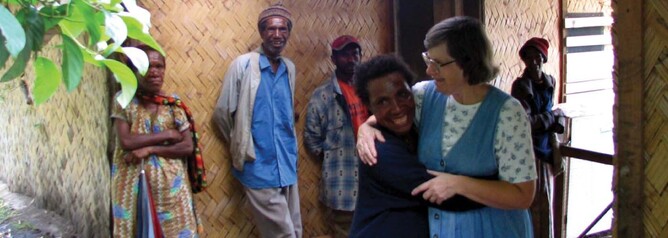I found 2 Co 4:7-10 to be so apt a description of the issues we faced in the Benabena work (except that we never experienced persecution) that I decided to use it as headings in this article.
We are hard pressed on every side, but not crushed…
In 1992 we started culture/language learning in the village of Katagu. But after a couple of years, Wendy came down with chronic fatigue syndrome and had to pull out, which left me to struggle on. By 1995 I came to a grinding halt. I was told by the consultants that I probably wasn’t going to be able to learn the language. In deep discouragement I cried out to the Lord asking, “Why did you send us to the Benabena people if I can’t learn the language?” In the middle of the night I suddenly had a mental picture of our house and our co-worker’s house in the fenced area. I then realized that God was showing me that we had fenced the people out so that I wasn’t getting enough exposure to the language. We determined to move to another village and build among the village houses. After a break at home in Australia, we returned in 1997 and moved further up the valley to the village of Koropa. It was amazing how different our relationship was with the people at Koropa. They made us part of their family and they still regard us as family. I made it through culture/language study and began Scripture translation and lesson preparation there.
Perplexed, but not in despair…
When we had enough Scripture translated and lessons prepared, we had to leave Koropa to work with our co-workers at Katagu. Having to leave Koropa and move to Katagu was very difficult for us emotionally. We had established such good relationships there. The Benabena work didn’t go the way we planned — things don’t always go the way we plan. God works out His own purpose and we often wonder what on earth He is doing. We planned to start the work at Katagu serving with our co-workers there, and plant a church that would take the gospel throughout the Bena area, but that never happened. Katagu was a difficult area to work in. The Katagu people were resistant to the gospel and many who professed to believe quickly fell away. We started teaching there in 2005, then, just as we got close to the end of the ‘Creation to Christ’ teaching, our co-workers had to leave. This left all the teaching on my shoulders, and on top of that I had to prepare lessons as well because all of the lessons had not been prepared. Miraculously we ended up with a small group of believers there. After our next home assignment, we felt the need to go back to Koropa because we had built relationships there. We felt that having built relationships there we had a responsibility to share the gospel with them. Also, Wendy was struggling with health issues and couldn’t face having to build again at Katagu. However, this caused tension between us and our co-workers. Eventually a house became available for us at the Interface property at Katagu. We agreed to move there and work with the believers at Katagu. But even as we worked there our hearts were with our family at Koropa, and we prayed for the opportunity to go back there and give them the gospel. As time went on, this became less and less likely.
Struck down, but not destroyed…
We began to disciple the believers and in time we baptised four of them. In 2009 we began training them to teach their own outreaches. Halfway through this program, Wendy’s health broke down and we had to leave the field. This was a very difficult time for us, especially when we heard that tribal fighting had broken out at Koropa, and we also learnt of the death of the father of the family that took us in. We felt that we had abandoned the Koropa people. The following year our co-workers went on home assignment, but they couldn’t return because of health problems. By 2012 we had heard nothing of the small group of believers at Katagu. It became difficult to pray for them, not knowing how they were going. So David took a trip to PNG to encourage them. He spent six weeks there, but realized that what they needed was for someone to be there permanently to teach and disciple them. This posed a huge problem, as there was no-one available to do that. We prayed for our co-workers, that they would be able to go back and continue the work there, but they were never able to and by 2014 they eventually had to resign from the field. We were devastated. I could see the years of work for the Benabena people going down the plughole. I pleaded with the Lord for answers. I told Him that I was willing to go back, but it would have to come from Wendy. The next thing I knew Wendy came and sat by me and said, “What if the Lord wants us to go back to Papua New Guinea?” That confirmed it — what a quick answer to prayer! Wendy’s health had improved, and the Lord challenged her at the same time He challenged me.
After two years of medical checks and negotiations with the Papua New Guinea government for work permits and visas, we finally arrived back in PNG in July 2016. We found the Benabena church non-existent. It reminded me of Jesus’ description of the people in His day, ‘like sheep without a shepherd’. There were four believers there, but they were not meeting together. I tried to get them together at our house on the centre, but that didn’t last long. One of the believers, Kokere, died and his wife moved to live with her family. That left just two people, whom I managed to get together for fellowship times and teaching in Romans. The 2017 dry season was the longest and driest that we had experienced since being in PNG. The people ran out of food and asked us for help. I explained that we couldn’t just give them food and not give it to the others in the village, and we could not supply the whole village. I tried to get them to look to God for help rather than the white missionaries, but they were reluctant to do that. Eventually I prayed with them for it to rain. Two days later it began raining and they got good rain out of it. The next time I went out, I expected that they would be thankful for the rain. Instead they said, “We are still hungry. We don’t even have sweet potato vines to plant (one of the PNG churches did send them sweet potato vines).” I tried to get them to pray for God’s help in that situation, but they said that they couldn’t pray while they had this ‘heavy’ — but that’s when they do need to pray. I tried to encourage them that God is our Father and He wants us to ask Him for help in these situations. They eventually asked me not to come out there for a while. This was very discouraging, and I got with our mission leaders to work out where we should go from there. They encouraged us to go back to our family at Koropa and teach them. We had been praying for years for this to happen, and now we were actually encouraged to do that.
I began teaching at Koropa with the help of Heti, one of the Katagu believers, in February 2018. We started at creation and taught through the Old Testament, then through the life of Jesus to His death, resurrection and ascension. We had a group of eight regulars and some others who were not as regular. After the last lesson on the resurrection and ascension, I questioned them one-to-one to find out if they were clear on salvation. They were clear on who Jesus is and what He did for us, but not clear on how to make that their own, how to be saved. So the next week I took them to Abraham and his faith. I asked them why God said, “In my eyes Abraham is a straight (righteous) man.” Did Abraham do something good? Did he go to church and hear preaching? Did he pray? No, he simply believed what God told him. I said, “It is the same with us. We don’t have to do anything, Jesus did it all for us on the cross. We simply trust in what Jesus did for us.” At that time, I was reasonably sure four of them genuinely trusted in Christ. They are pictured below: Sevis (standing far right), Dolis (standing third from right), Robert (sitting next to Dolis), and Ableso (sitting in the middle of the photo behind the boy holding a long stick). An old man, Papaso, also seems to have a clear understanding of salvation.
I am now teaching them what we call phase two. Phase two takes you through the Creation to Christ lessons again in an abbreviated form for believers, emphasizing how the Old Testament speaks about Christ. Then phase two prepares them for the coming of the Holy Spirit in Acts, and emphasises the victory we have through the resurrection of Christ. After that we will start teaching through Acts and hopefully start teaching Romans next year. Our plan at present is to finish up here by July 2020, but the work is far from finished. A lot of Scripture translation and church development needs to be done yet, so please pray for others to take over the work from us.
Issues Wendy is facing this term in PNG
Wendy says, “Coming back to PNG this time was very different for me. While we were in Australia for seven years, my two sisters died within 27 hours of each other. That was terribly emotional at the time, but I had my younger brother’s wife Gayle Norris to stand with me in that situation. She was a real gem through it all. When we were in PNG for the first 22 years, my sisters Gwen Young and Noela Silcock were a tremendous support in many ways, shopping and doing other things for me. So there have been some significant adjustments without them this time. Gayle continues to be a blessing and she does what shopping she can for me, helped by some of the ladies from church.
“The next trauma was to find out that Gayle has a tumour in her brain and the doctors have given her one to five years, as it is one of the bad tumours. It has been rough not being able to spend time with her, like I would if we were in Australia. The next thing was to find out that David’s brother Ted was unable to look after our dog for us anymore, he was just getting too much for him to look after and Ted isn’t getting any younger either. So Sam, our dog, had to go to the pound. I have had a dog for years and worked with them, so they could be cared for by others, but I had never had a dog go to the pound before. Not knowing what is happening to him has taken some working through at times.
“Then, about a month ago, I found out that three couples, who have been our friends here in PNG over the years, are retiring. They are all about five years younger than we are, so another shock. I will miss them heaps, but we can keep in touch via e-mail. I am learning to give myself space because it takes time to work through grief, but the Lord is ever faithful and wanting to draw us closer to Him in all these things.”
So please continue to pray for our ministry in PNG, and pray that God will sustain us.
by David and Wendy Lee


